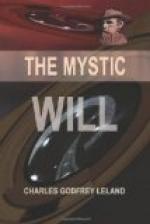So consistent is the system that even if Waking Reason abstract itself, not to sleep, but to think on one subject such as writing a poem or inventing a machine, certain affinities will sleep or dreams begin to show themselves. When Genius is really at work, it sweeps along, as it were, in a current, albeit it has enough reason left to also use the rudder and oars, or spread and manage a sail. The reason for the greater fullness of unusual images and associations (i. e., the action of genius) during the time when one is bent on intellectual invention is that the more the waking conscious Reason drowses or approaches to sleep, the more do many images in Memory awaken and begin to shyly open the doors of their cells and peep out.
In the dream we also proceed, or rather drift, loosely on a current, but are without oars, rudder or sail. We are hurtled against, or hurried away from the islands of Images or Ideas, that is to say, all kinds of memories, and our course is managed or impelled, or guided by tricky water-sprites, whose minds are all on mischief bent or only idle merriment. In any case they conduct us blindly and wildly from isle to isle, sometimes obeying a far cry which comes to them through the mist—some echoing signal of our waking hours. So in a vision ever on we go!
That is to say that even while we dream there is an unconscious cerebration or voluntarily exerted power loosely and irregularly imitating by habit, something like the action of our waking hours, especially its brown studies and fancies in drowsy reveries or play.
It seems to me as if this sleep-master or mistress—I prefer the latter—who attends to our dreams may be regarded as Instinct on the loose, for like instinct she acts without conscious reasoning. She carries out, or realizes, trains of thought, or sequences with little comparison or deduction. Yet within her limits she can do great work, and when we consider, we shall find that by following mere Law she has effected a great, nay, an immense, deal, which we attribute entirely to forethought or Reason. As all this is closely allied to the action of the mind when hypnotized, it deserves further study.
Now it is a wonderful reflection that as we go back in animated nature from man to insects, we find self-conscious Intellect or Reason based on Reflection disappear, and Instinct taking its place. Yet Instinct in its marvelous results, such as ingenuity of adaptation, often far surpasses what semi-civilized man could do. Or it does the same things as man, only in an entirely different way which is not as yet understood. Only from time to time some one tells a wonderful story of a bird, a dog or a cat, and then asks, “Was not this reason?”
What it was, in a great measure, was an unconscious application of memory or experience. Bees and ants and birds often far outdo savage men in ingenuity of construction. The red Indians in their persistent use of flimsy, cheerless bark wigwams, were far behind the beaver or oriole as regards dwellings; in this respect the Indian indicated mere instinct of a low order, as all do who live in circles of mere tradition.




